
In 2024, How to Remove Forgotten PIN Of Your Itel P40

How to Remove Forgotten PIN Of Your Itel P40
Users of Android phones can benefit from data and file protection tools like passwords, patterns, and PINs. But there are also some significant hazards. For instance, your children may have repeatedly used the wrong password to access your Android phone, or you may have forgotten PIN on your device, pattern, or PIN.
We can use various valuable techniques to remove the Android phone password. According to you, the most typical or initial option must be factory reset. However, if you try to use the factory reset, you will lose all the data on your Android phone.
Read the information below, but first, let’s talk about Android phone passwords and how they operate before moving on to the ways.
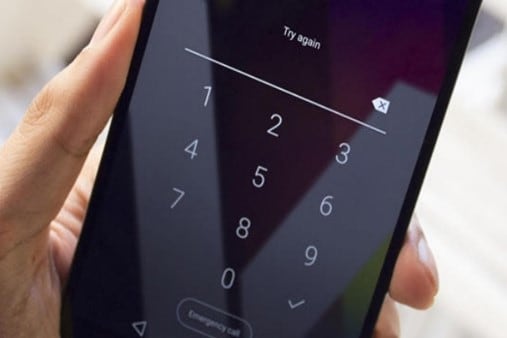
The Importance of the Android Lock System
In general, phone passwords are used to secure your device against unauthorized access and shield your files and data from it. You can try using a pattern, password, PIN, or another method to unlock your device. Although it has many benefits, there are also hazards. Risk in the sense that if you lose your device’s password or pattern, you will be unable to access it and will be stuck somewhere.
Several firms are making Android phones, so why shouldn’t more? Because Android phones are in high demand, numerous new businesses are now producing them. We can see that more people than any other operating system use mobile devices with Android. With an Android phone, we can do many functions, be constantly connected to the outside world, and everything runs smoothly.
This is an important issue that needs to be resolved right away. Therefore, some methods can assist you in getting out of it, one of which is doing a factory reset. They believe this is the most effective and secure way; thus, many try it. What about the information you have on the Itel P40 device, though? What should you do next because a factory reset will destroy your data?
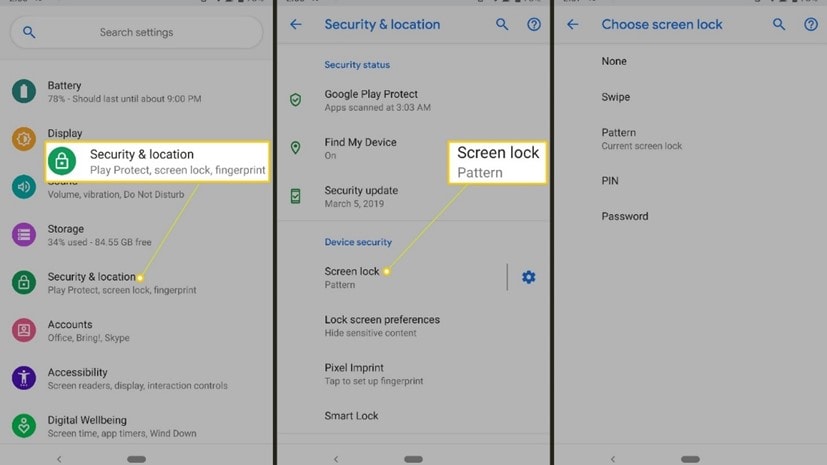
Methods to Recover Forgotten Password or PIN
1. Google Smart Lock
If you have added a trusted area or device in Google Smart Lock, you can go to that trusted area and reset your password. Alternatively, you can also use trusted devices to unlock your device.
2. Google Find My Device
As you are likely aware, every Android device is connected to a Google account. As a result, if you’d like, you may also use it to unlock Android. You’ll need to know your Google account login information for this. When you’re ready, use these instructions to find out how to unlock a phone password.
- Login using your Google credentials by going to the official Google Find My Device website.
- You will see the gadgets connected to your Google account as you enter the interface and a map of where they are.
- To wipe the Itel P40 device, click the ERASE DEVICE option on the left side panel. You will then be required for your password.
- Once more, select “Erase.” This will reset the Itel P40 device and get rid of the forgot pattern lock.
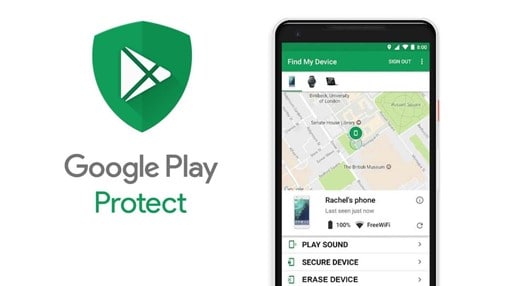
3. Recovery Mode
Users of Android smartphones and tablets can troubleshoot various issues with their devices using a feature known as Android Recovery Mode. If you discover that your device is functioning strangely, it might be helpful. Recovery Mode Android technically refers to a unique bootable partition with a recovery application installed inside it.
However, users can also use it to reset the android password if it is forgotten. The instructions for resetting android devices through recovery mode differ for every android device.
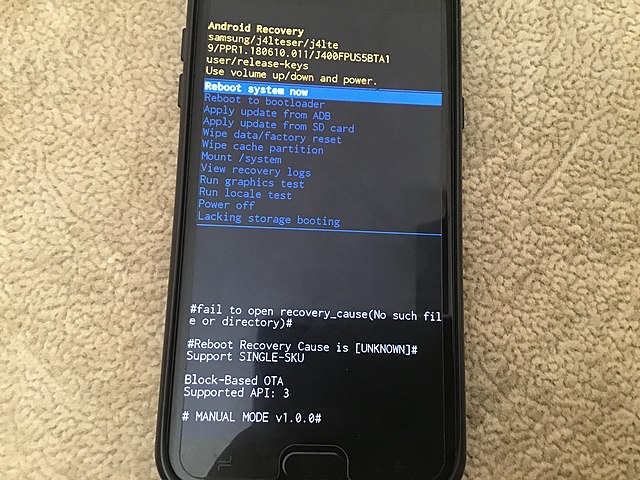
4. Dr.Fone - Screen Unlock
On most Android handsets, it is wise to give it a try on Dr.Fone to unlock the screen lock easily. It allows you to remove the password, PIN, pattern, and fingerprint from an Android phone.
Step 1. Select Unlock Android Screen
Please select “Unlock Android Screen” to ensure you have the correct unlock process.
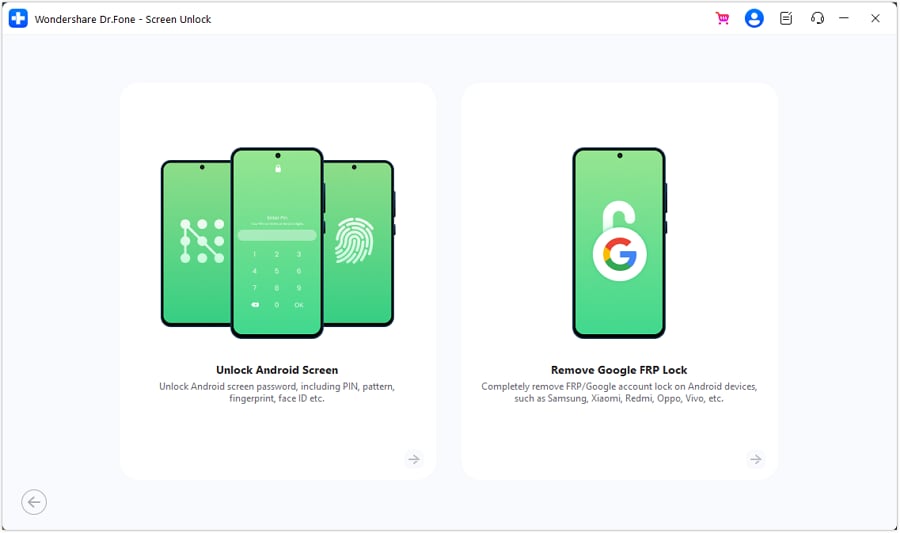
Step 2. Select device model
If you see this page, please choose the option fitting your phone, otherwise, you can’t unlock your device as you wish.
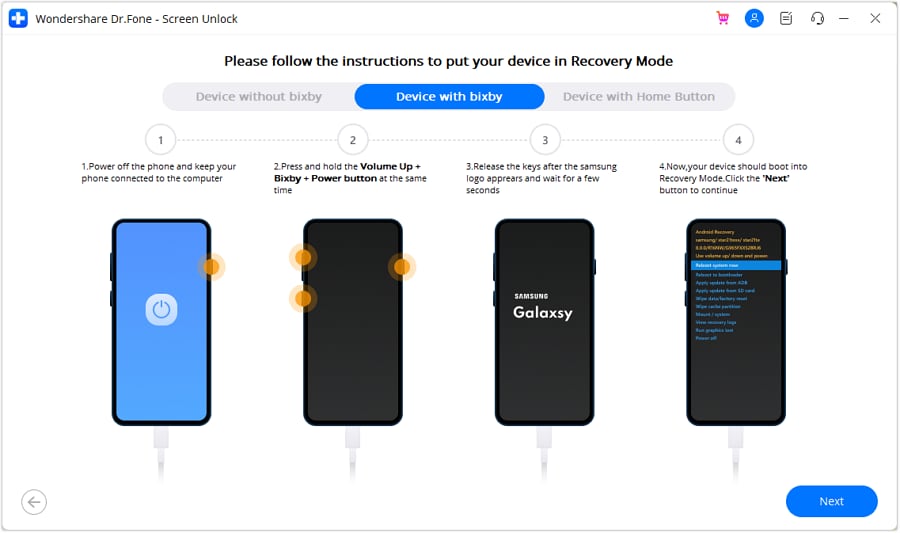
(Enter Recovery Mode via the Samsung phone with Bixby)
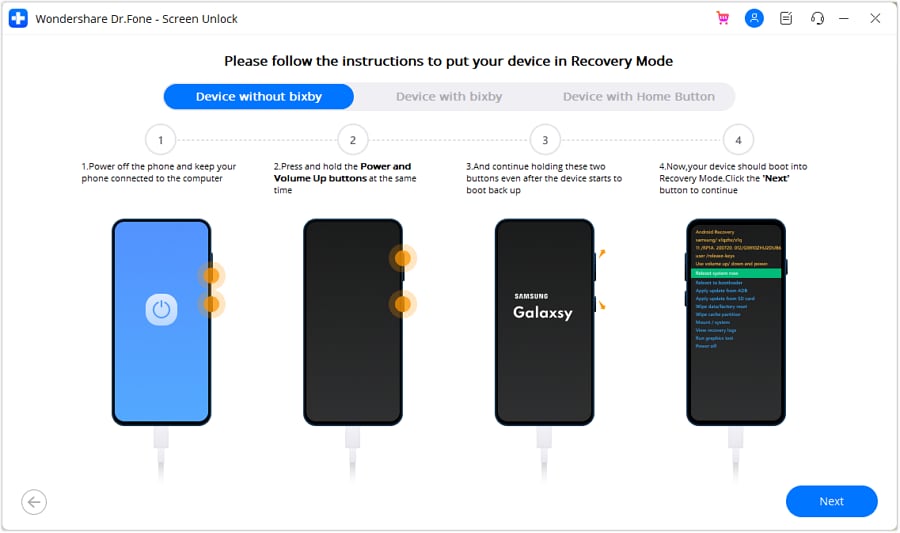
(Enter Recovery Mode via the Samsung phone without Bixby)
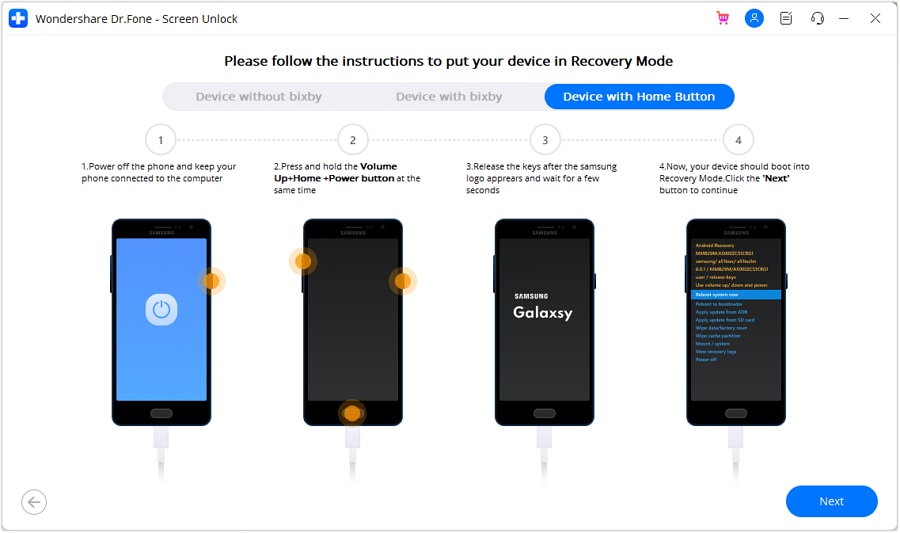
(Enter Recovery Mode via the Samsung phone with the Home button)
Step 3. Instructions to Wipe Cache Partition
On the page Recovery Mode, it’s the most important step to unlock your device. Please click the right buttons.
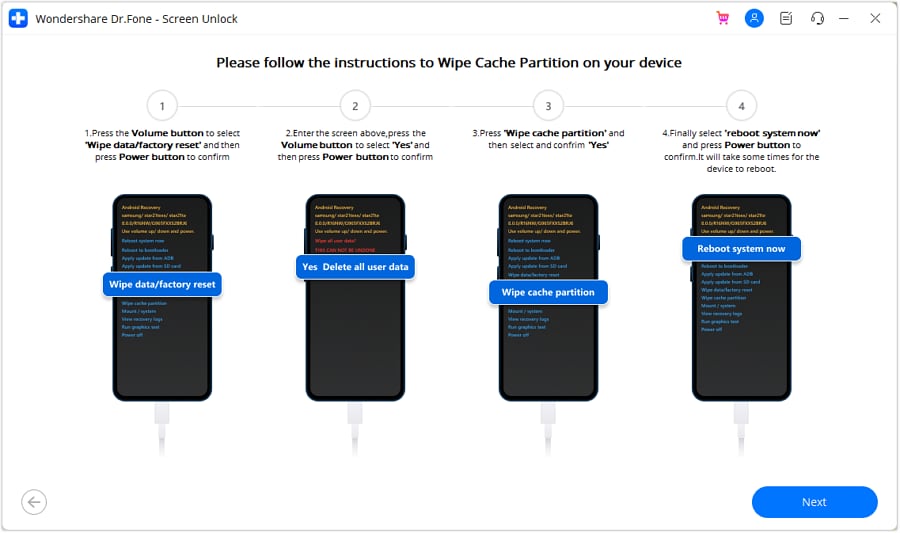
Congratulations! Now you can access your phone again, and there’re no obstacles when you do anything on your phone.
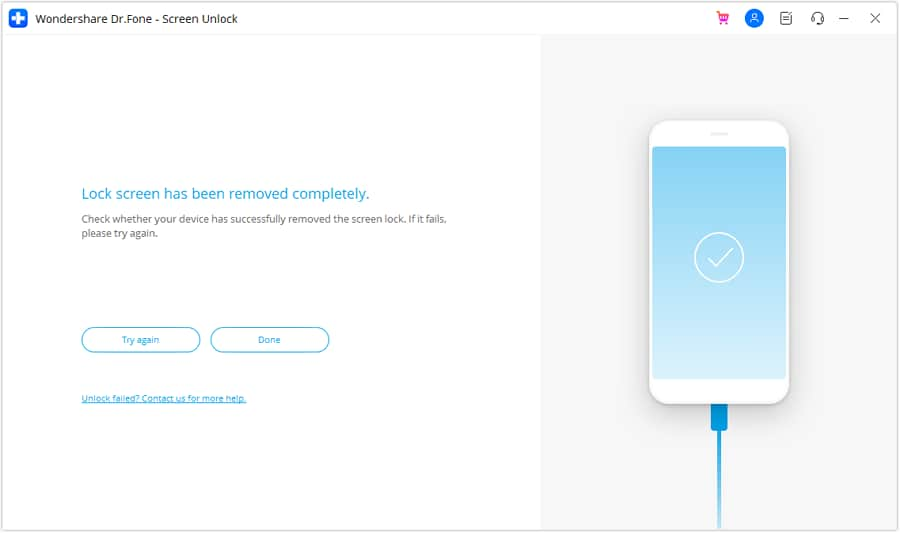
FAQs
- Will Dr.Fone - Screen Unlock Do Harm To My Itel P40?
Answer: No, Dr.Fone is safe for your device, all hardware will be safe, and you can still use your phone as usual when you try our products, but for devices other than Samsung and LG, you may have to face data loss. So, if you want to keep your data safe, please have a backup on your phone.
- How To Keep My Data Safe?
Answer: Dr.Fone - Phone Backup is a good option for backing up the sensitive data on your device. If you want to know more, don’t hesitate and find any required information on our website.
Conclusion
Any methods mentioned above can work to overcome the obstacle of unlocking the screen with your Android handset. The best thing about all methods we said is that you just need some easy ways to complete the tasks.
The Ultimate Guide to Itel P40 Pattern Lock Screen: Everything You Need to Know
Do you want to revamp your phone’s pattern lock screen and give it a new life? Well, you are not the only one! Lots of Android users keep looking for numerous ways to change their screen lock pattern and make it more secure. After all, if your lock screen pattern is strong, then it will certainly keep an intruder away. In today’s world, our privacy is everything and we should take every needed measure to protect it. To help you do the same, we have come up with this informative guide. Read on and learn how to set up a strong pattern lock screen on your device and what to do if you have forgotten it.
Part 1: How to set up Pattern Lock Screen on Itel P40?
Out of all the provided options for screen locks, pattern lock is mostly used due to its ease of access and added security. If you haven’t set up a screen lock pattern on your device, then we recommend you to do the same right away. Not only will it keep intruders away, it will also protect your privacy. To learn how to set up a lock screen pattern on an Android device, simply follow these steps:
- 1. Firstly, unlock your device and go to its Settings. You can access it from the Home Screen or from its Notification Center.
- 2. Under the personal or privacy section, you can access the “Lock Screen and Security” option.
- 3. In some versions, the option is also listed right at the top of the settings (in its quick access).
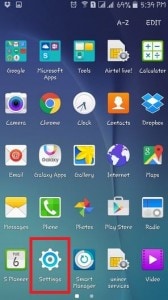
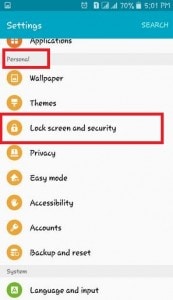
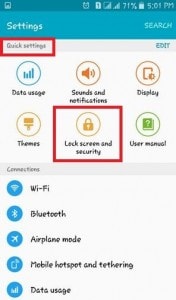
- 4. To set up a pattern lock screen, tap on the “Screen lock type” feature.
- 5. This will provide a list of all the different kinds of locks that you can apply. Ideally, it would be password, pin, pattern, swipe, or none. In “Swipe”, you can unlock a device just by swiping the screen. Whereas, in pattern, pin, or password, you would be needed to provide the respective pattern/pin/password to unlock the Itel P40 device.
- 6. We recommend setting up a lock screen pattern instead. To do this, tap on the “Pattern” option.
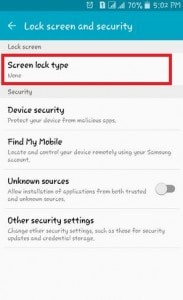
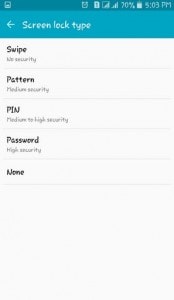
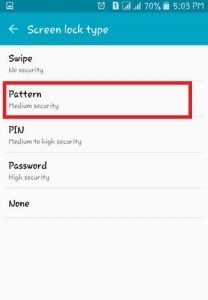
- 7. From the next screen, you can simply draw any kind of pattern of your choice. Ideally, it should join at least 4 dots on the screen. We recommend using a strong screen lock pattern to provide unmatched security to your device.
- 8. Furthermore, you need to confirm your choice and provide the same pattern once again. Make sure that you draw the same pattern here.
- 9. Additionally, the interface will ask you to provide a security pin as well. In case if you will forget your pattern, then you can access your phone by taking the assistance of this pin.

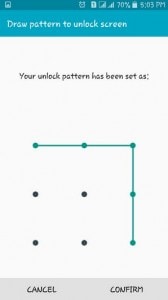
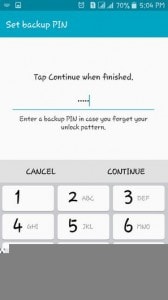
- 10. Similarly, you would be required to confirm the pin as well to finish the setup.
- 11. That’s it! By completing these steps, a screen lock pattern will be implemented on your device.
Later, you can follow the same drill to change your device’s lock screen pattern as well. Though, you would be needed to provide the existing pattern to access these features. Out of all the lock screen options, you should go with the pattern lock. Not only it is the most accessible option, it also provides fast results with an added security.
Part 2: What to do if you forget Android pattern lock?
After following the above-mentioned tutorial, you would be able to set up a pattern lock screen on your device. Since it is recommended to have a strong pattern lock, users often forget their pattern lock after implementing it. This prohibits them from using their own Android device. If you have a similar experience, then don’t worry. There are plenty of ways to unlock a device and remove its pattern lock without causing any harm to the system. Visit our informative tutorial and learn different ways to unlock or bypass the Android pattern lock screen.
Out of all the provided options, it is recommended to use Dr.Fone - Screen Unlock (Android) . It provides fast and reliable results without getting rid of your device’s content. The tool is a part of the Dr.Fone toolkit and is already compatible with all the leading Android smartphones. By following its simple click-through process, you can unlock the screen lock pattern on your device in no time. Although this tool can help you keep all data after unlocking screen passcode on your Samsung or LG phone, it will wipe all data after unlocking other Android phone including Huawei, Oneplus and so on.
Dr.Fone - Screen Unlock (Android)
Remove 4 Types of Android Screen Lock without Data Loss
- It can remove 4 screen lock types - pattern, PIN, password & fingerprints.
- Only remove the lock screen, no data loss at all.
- No tech knowledge asked, everybody can handle it.
- Work for Samsung Galaxy S/Note/Tab series, and LG G2, G3, G4, etc.
4,820,695 people have downloaded it
Part 3: Top 10 Hardest pattern lock ideas for Android
Your pattern lock is one of the most important security aspects on your device. Anyone can access your phone after decoding your pattern lock. Needless to say, if you have a simple pattern lock on your device, then it can easily be accessed by someone else. To help you set up a strong pattern lock screen, we have handpicked some of the hardest combinations. Have a look at these lock screen pattern combinations and choose the one you like the most!
For your convenience, we have marked the dots as 1-9. This will help you know the exact sequence of the lock.
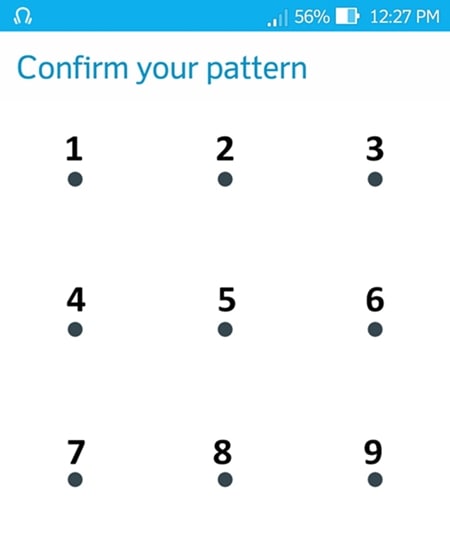
1
8 > 7 > 4 > 3 > 5 > 9 > 6 > 2 > 1

2
7 > 4 > 1 > 5 > 2 > 3 > 8 > 6

3
1 > 8 > 3 > 4 > 9

4
7 > 4 > 2 > 3 > 1 > 5 > 9

5
2 > 4 > 1 > 5 > 8 > 9 > 6 > 3 > 7

6
8 > 4 > 1 > 5 > 9 > 6 > 2 > 3 > 7

7
7 > 2 > 9 > 4 > 3 > 8 > 1 > 6 > 5

8
5 > 7 > 2 > 9 > 1 > 4 > 8 > 6 > 3

9
1 > 5 > 9 > 4 > 8 > 2 > 6 > 3 > 7

10
7 > 5 > 3 > 4 > 2 > 6 > 1 > 9

After selecting and setting up a new screen lock pattern on your device, make sure that you remember it. You can lock and unlock your phone a few times with your new pattern lock in order to memorize it. Nevertheless, if you forget your lock screen pattern, then you can take the assistance of Dr.Fone Android Pattern Lock Removal to get an instant solution.
Now when you know every essential thing about pattern lock screen on Android, you can certainly keep your device safe from any unforeseen intrusion. A strong lock screen pattern will certainly be of a great use to you. It will protect your apps, data, and device accessibility in an effortless manner. Go ahead and set up a strong and secure pattern lock screen on your device and provide an added layer of security to it.
Still Using Pattern Locks with Itel P40? Tips, Tricks and Helpful Advice
They have been along for a long, long time now – pattern locks – the easiest of all smartphone locks. You just swipe your finger across to create an easy pattern lock of your choosing and that’s it, it becomes your new screen lock. No more remembering tedious digits! So, why have these easy pattern locks become outdated, and why do people still continue to use them? Let’s take a dive and find out all about pattern locks.
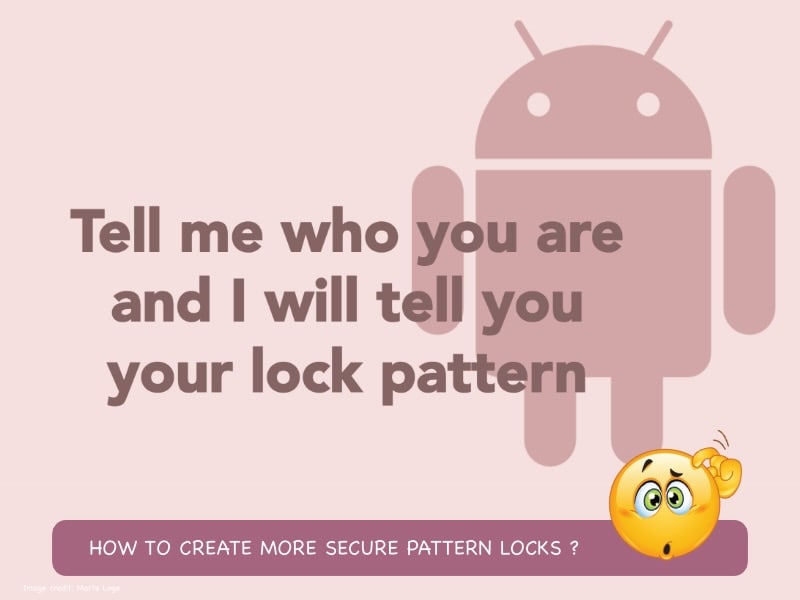
Part I: Things To Know About Pattern Locks
The first cellphone locks were 4-digit number locks. Then came 6-digit codes, and even alphanumeric ones. Pattern locks were all the rage a while ago. Though pattern locks continue to be used, they are not considered safe to use any longer. What is all that about? Here’s what you need to know about pattern locks, whether you are a seasoned pattern lock user or not.
I.I: What Are Pattern Locks?
Believe it or not, technology has advanced at such a rapid pace in the last two decades that you’d be forgiven if you don’t know what a pattern lock is, especially if you have only ever used iPhones, or Android phones in just the last few years.
Pattern locks are patterns you create on your smartphone and designate as a smartphone lock/ screen lock. There is a 9-point keypad of sorts, and you start swiping your finger from any point to any point for any which way you feel like. Android 13 allows a minimum of 4 points registered. They are easy to create, and easy to use, hence called easy pattern locks.
Pattern locks have only ever been offered on Android devices and were commonplace a few years ago until they were deemed not secure enough for use by modern standards because they were easy to figure out by malicious actors.
I.II: Popularity and Usage
Pattern lock is a feature unique to Android and has been so since the start. Naturally, it is one of the preferred ways users have come to unlock their Android devices over the years. Even though modern Android smartphones come with fingerprint recognition and face recognition technologies, there exists a large subset of users still addicted to and acclimatized with the pattern lock feature, opting over fingerprint and face recognition.
There has been, however, research conducted into the safety and security offered by pattern lock in Android.
I.III: Advantages and Drawbacks
Modern smartphones very nearly contain the entirety of our lives; photo memories, video memories, important documents both financial and personal in nature, banking apps, ID and ATM/ credit cards in the “wallet” apps, and whatnot. A smartphone falling into the wrong hands could very nearly be used to devastate the rightful owner, both financially and otherwise. And this is not a claim out of thin air; spyware/ malware/ phishing attacks are on the rise around the world. Locking the smartphone, once considered optional and an unnecessary hassle, is now an absolute must.
Advantages of Pattern Locks
There is no denying that using an easy pattern lock to lock their smartphone seems enough for most users. Swiping your finger across your smartphone to unlock it feels not only cool and futuristic but safer and more secure than remembering and punching in digits. And, for the most part, it is true, given that 4-digit PINs can only have 10,000 unique combinations!
Disadvantages of Pattern Locks
While very easy to use, security researchers and experts have come to agree that the feature is not in the least safe to use, and that is because of how people use the pattern lock feature (discussed in detail below in part II). Some go so far as to say that most pattern locks can be breached in just 5 attempts or less. Imagine that!
What is more, research has found that humans have an uncanny ability to correctly guess a pattern lock simply by viewing the unlocking! The test comprised showing the test subjects videos of users unlocking their phones from different angles and varying distances, and it was found that around 64% of test subjects were able to correctly guess a 6-point pattern lock in one viewing only, and 80% could correctly guess the pattern after just two viewings. By contrast, only 11% were able to correctly deduce a 6-digit PIN after one viewing, and only 27% after viewing twice. This goes to show just how insecure pattern locks are!
Part II: How People Use Pattern Locks
We might wonder how anyone would be able to guess the correct pattern of our device, but believe it or not, it is possible, eerily easily at that! We are all the same humans, after all! You know how people usually set PINs that could be significant dates in their lives? How they get car registration numbers that mean something to them? The same ‘logic’ applies to their setting pattern locks.
At DEFCON 23, Marte Loge, an M.Sc. Computer Science student, presented something that stunned people around the world. She said, “Tell me who you are, and I will tell you your lock pattern.” What followed was an expert presentation outlining and detailing user behaviors around pattern locks.
These are some commonly created pattern locks by people:
- - shapes of alphabets,
- - shapes of numerals,
- - any other easy-to-make, simple shape.
Marte Loge presented the image below, showing how people naturally gravitate towards creating simple shape patterns, in her research.
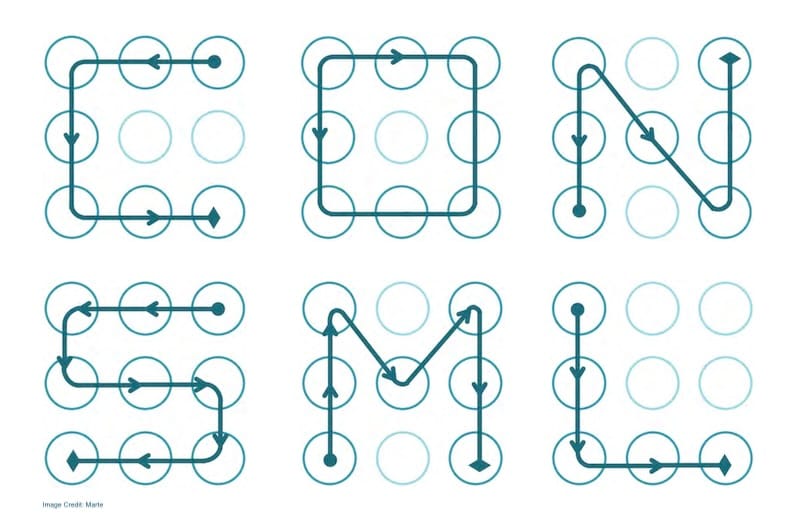
To further help you see how easy it might be for anyone to guess your pattern, Marte Loge also presented some statistics.
- - 77% of people started their patterns in one of the 4 corners.
- - 44% of Loge’s subjects started their pattern with the first dot, the top-left one. The next number was 15% for the top-right and 14% for the bottom-left.
- - These percentages did not vary much depending on left-handedness or right-handedness.
- - On average, irrespective of gender, people set 5-point patterns, with 4-point patterns being the most common. This means that the number of combinations on average was 7152 for 5-point patterns and a bogglingly low 1624 for 4-point patterns.
The above data makes it amply clear how using an easy pattern lock is actually worse than using a 4-digit PIN, simply because how people are usually using the pattern lock feature.
Part III: Tips For Using More Secure Pattern Locks
Now, we know how hard it is to break habits cemented over years of use, so in case you must at all costs use a pattern lock only, the least you can do is try and change your easy pattern lock to a better, more secure hard pattern lock.
III.I: How to Create More Secure Patterns
Here are some tips to help you create a better, more secure pattern lock for your smartphone.
- - Avoid using any of the corners to start the pattern.
- - Never use your first initial as a pattern.
- - Never use a digit shape as a pattern.
- - You can pass through the same pattern lines multiple times over. This makes it more difficult for someone to guess your pattern correctly.
- - Use all 9 points on the grid while setting the pattern lock! That simple act takes the possible pattern combinations to over 140,000, significantly more than 10,000 for 4-digit PINs, and vastly superior to paltry 1624 for a 4-point easy pattern lock!
III.II: Forgot Your Pattern? Unlock Your Itel P40 Without Pattern Lock With Dr.Fone
Supercharged with the information above, you went ahead and changed your easy pattern lock to a hard-to-guess pattern lock. Only problem is, your brain is habituated to that old pattern, and you’ve suddenly forgotten what the new pattern was! Well, worry not; Wondershare Dr.Fone - Screen Unlock (Android) will help you unlock your phone without pattern lock !
Dr.Fone - Screen Unlock (Android)
The Best Tool to Unlock Your Itel P40 without Pattern Locks!
- Remove all Android screen locks (PIN/pattern/fingerprints/face ID) in minutes.
- Bypass the FRP lock of Samsung without a PIN or Google account.
- Everyone can handle the lock screen without any tech knowledge.
- Provide specific removal solutions to promise good success rate.
4,008,669 people have downloaded it
Download the newest version of Dr.Fone from the Wondershare website and launch the app.

Step 1: Go to Toolbox > Screen Unlock and click Android.
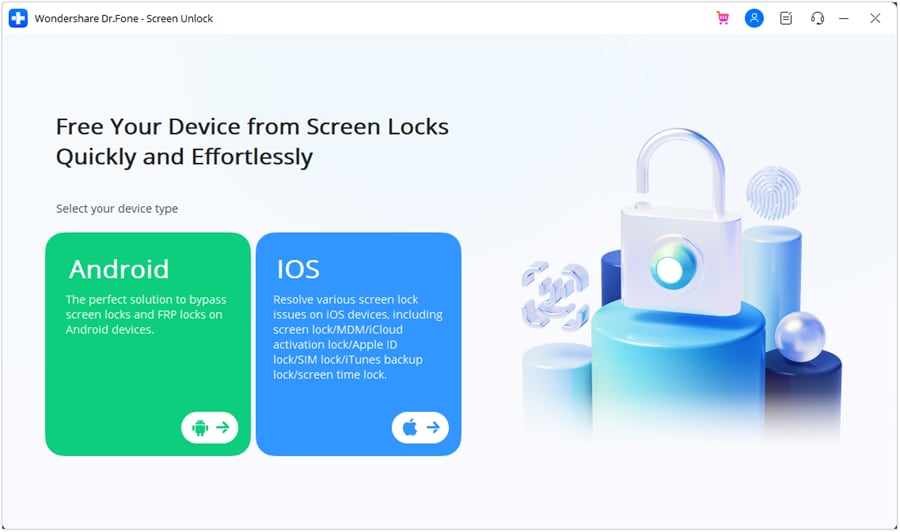
Step 2: Click Unlock Android Screen.

Step 3: You will see a list of supported manufacturers on the next screen. Select yours.
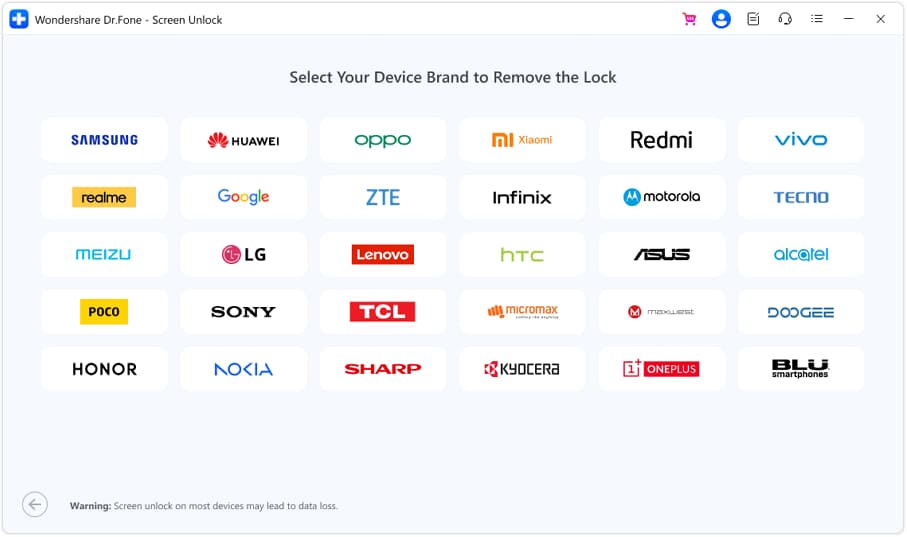
Step 4: Now, follow the onscreen guide to prepare your device for screen unlocking.
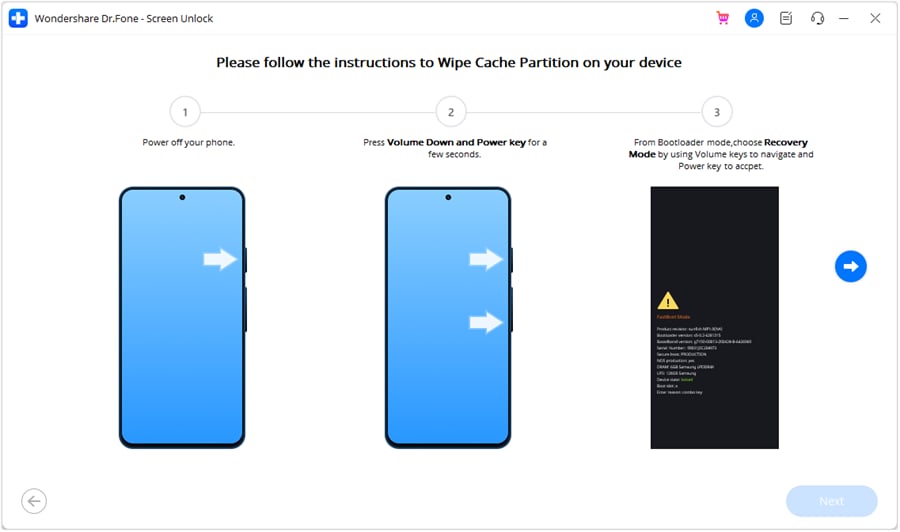
After completing the process, when the Next button becomes available, click it.
Your device will be successfully unlocked.
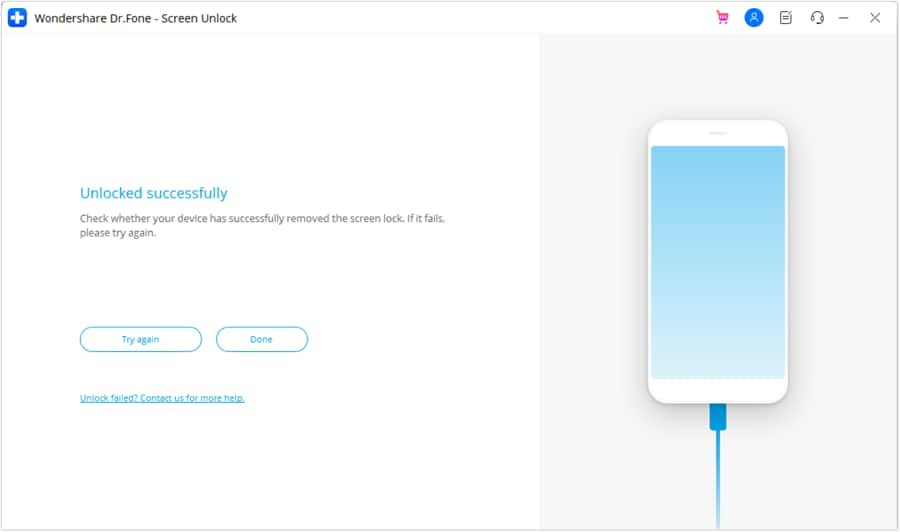
Note that this method wipes all data on the Itel P40 device. There is no way around it. You may be able to unlock select older Samsung devices without data loss. Check this list for those devices.
Closing Words
Pattern locks are outdated and not safe to use an easy pattern lock – there are no two ways about it. As such, our recommendation is to start using a 6-digit PIN along with biometric or face recognition. However, we do understand that sometimes, you simply cannot use biometrics or face recognition. For those instances, we recommend that you use this guide and create a more secure pattern lock for your device. In case you forgot your pattern, there is always Wondershare Dr.Fone – Screen Unlock (Android) to save the day.
- Title: In 2024, How to Remove Forgotten PIN Of Your Itel P40
- Author: Marry
- Created at : 2024-07-18 16:11:59
- Updated at : 2024-07-19 16:11:59
- Link: https://unlock-android.techidaily.com/in-2024-how-to-remove-forgotten-pin-of-your-itel-p40-by-drfone-android/
- License: This work is licensed under CC BY-NC-SA 4.0.

